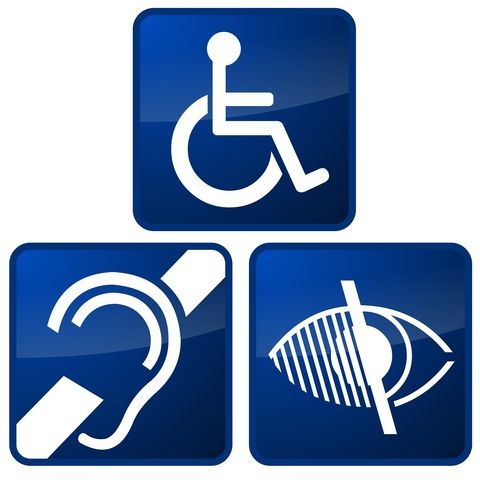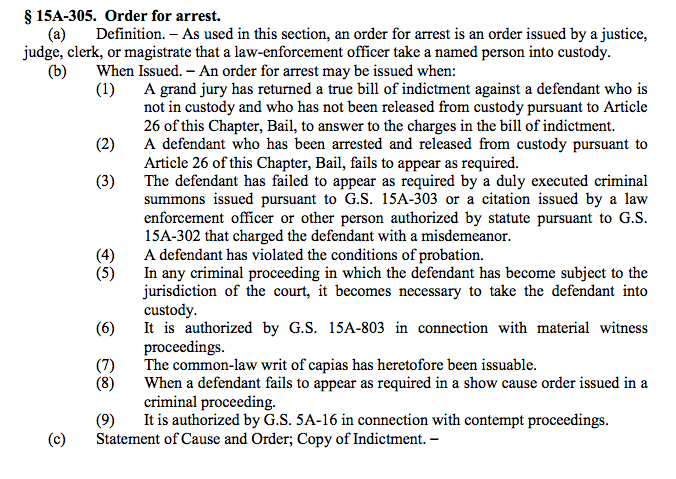Failure to Appear to Court? What is an OFA? How To Strike an Order for Arrest in North Carolina
- OFA stands for Order for Arrest
- FTA stands for Failure to Appear
- FTC stands for Failure to Comply
Frankly, when it comes to court, funerals, and weddings, it’s better to be early than late – Bill Powers
See More: Criminal Process in North Carolina

Modified Transcript of “How To Strike an Order for Arrest” for the Hearing Impaired
Bill Powers:
Here’s another question that we have. These things have been popular where I just sit down and answer generally how the system works based on questions that are posted on public message boards.
These aren’t questions that clients have asked us. These are just things we see online. This is an interesting one. It says, “My daughter was arrested in courtroom for FTA. She was there for the first roll call and 10 minutes late for the second roll call. Is there any way to get the judge to release her?”
First of all, let’s explain some of the terminology, FTA. FTA normally, in North Carolina, especially when we talk about calendar calls and that’s what they’re referring as a roll call, FTA stands for failure to appear. Meaning that just like in elementary school or high school, they called roll. Sometimes they call in alphabetical order. Sometimes they call it just on the basis of the way the state has the shucks or the files that we see in court.
Now, in North Carolina, that brings up another point. The way we fold up our paperwork, we normally tri-fold it. We put it in a envelope that has a clear front. In North Carolina, we call that a shuck. I don’t know why. I think maybe it’s … You think about an ear of corn and it has an outside protective cover of the corn. I guess that’s how it is in North Carolina. I don’t know. If anyone knows, please call or email me. I’d love to know but I’ve never seen that anywhere. I like to know the etymology of the word. If we’re in district court, you’ll see DAs have a series of … It looks like you took a piece of paper and folded it in half and that’s called a roll.
Before they do so, they’ll often times explain to you you could enter one of several different types of pleas. You can enter plea of guilty. You can enter a plea of not guilty. If you have an attorney, please let us know your attorney’s name. Then they just try to get through the rolls. See who’s there. See who’s not there. They check and confirm to see maybe some of those people are in jail, or in custody, or maybe they’re in prison somewhere else.
The first time we often time see in district court on a daily basis is calling the roll. We call that calendar call. Now, what happens if you’re late? Well, generally speaking it’s not good to be late to court. There is a very limited amount of court time in North Carolina. It’s extremely valuable and precious. We have a limited amount of time to handle a lot of different type of cases. I’ve seen cases over the years where sometimes the judge understands and when they call the roll, they say, “Well, next time be here on time. If you’re late again, I’m going to issue process against you,” if it’s appropriate. I’ve seen other times where you come in late to court, and I’ve seen the bailiff or the sheriff’s deputy put the handcuffs on them, and lock them up. That person has to post a bond again.
There are normally some level of considerations. Sometimes that’s just the way they do. Sometimes it’s just the way a particular jurisdiction or court handles things and everybody’s late, issues some sort of process. Some jurisdictions if you perpetually miss court, or if you miss court more than once on a particular case, or if you’re known for missing court on other matters, maybe they’d do it.
I like to tell clients be there early. Anticipate that if you have a calendar call on a Monday morning, it may be busy. Anticipate if there’s a calendar call in a rainy day, there may be traffic or wrecks. Anticipate that if you’re having to take public transportation to court, it may be late or take longer to get somewhere than you expect. Frankly, when it comes to court, when it comes to funerals and when it comes to weddings, it’s better to be early and not late. I guess with a funeral maybe if you’re late for your own funeral, that’s okay.
Long and short is I encourage people to get there about half hour early to get a feel for the courthouse. They find out where the different things are. You get a seat. You got to sit where you’re comfortable and you can get lie of the land. Sometimes we just have clients come even if they’re not required to on a first appearance so that you can get a feel for the court system. You know where the courthouse is and who the parties are. Make sense, right? You have a comfort level when you’re dealing with your matter in court.
Now, the next question is: is there anything that could be done? Well, if the judge issued process, and are not wiling to recall the order, and are not willing to strike an order for arrest or an order forfeiture, and it’s important to discuss these, you may be just posting bond and getting out again. Now, what’s the difference between order for arrest and order forfeiture? Order for arrest is the judge saying, “If you see this person or if you can go out to their house or where they work, go get them. Put them into custody. Bring them in jail and eventually we’ll get them to court.” An order forfeiture means that if there was a bond set, if there was a term and condition to release where either a bonds person or a cash bond was paid, and there was money held by the system to make sure you show up to court, that can be forfeited, meaning you don’t get it. They get to keep it.
It’s important to recognize that if you are trying to strike an order for arrest, if you’re trying to get somebody out of jail, what are the consequences from a monetary standpoint? Can you strike that order of forfeiture? Sometimes you can. Sometimes you can’t. If it’s been served, it’s hard to do.
Again, if you have questions on criminal matters whether they’re felonies or misdemeanors in North Carolina, we help people throughout the state. We have an office here in Charlotte. If you give us a call, we’ll give you a free confidential consultation to explain what you can do to may be secure or release a bond if you miss court. I look forward to hearing from you.
 Carolina Law Blog
Carolina Law Blog